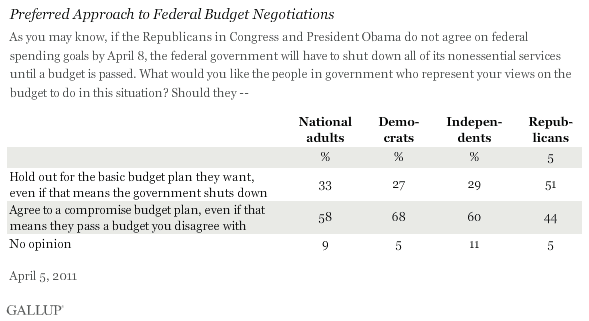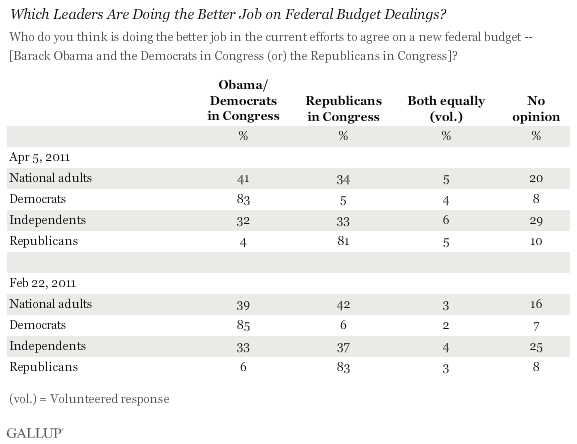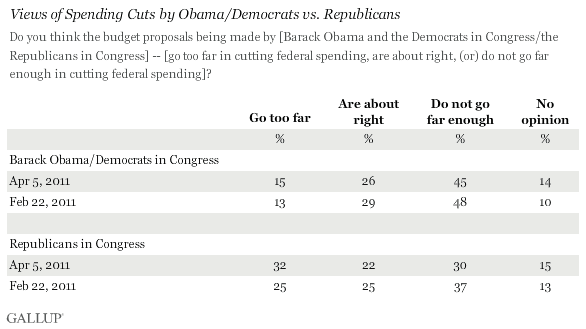PRINCETON, NJ -- With Congress facing a midnight Friday deadline to pass a federal budget before a partial government shutdown occurs, a new Gallup poll finds Americans rooting for a deal. By 58% to 33%, more Americans want government leaders who share their views on the budget to back a compromise and avert a shutdown rather than hold out for a budget they agree with.

These findings are virtually unchanged from February.
The difficulty for House Speaker John Boehner and other Republican leaders is that rank-and-file Republicans' views on this question are starkly different from those of the public at large. The slight majority of Republicans nationwide, 51%, want the people in government who share their views to hold out for a budget they agree with rather than compromise. This compares with 27% of Democrats and 29% of independents who say the same.
Obama and Democrats Get Better Marks on Budget Dealings Than Republicans
The same poll finds that slightly more Americans believe President Barack Obama and the Democrats in Congress are doing the better job on the budget dealings than say the Republicans in Congress are, 41% to 34%.

The percentage of Americans preferring the Republicans in Congress on this question slipped to 34% from 42% in late February. At the same time, the percentage of Americans having no preference for either side (those who say both parties are doing an equally good job or who have no opinion) rose from 19% to 25%, while their preference for Obama and the Democrats held steady at close to 40%.
Center of Balance on Spending Cuts Is Still to the Right
Despite Americans' preference for Obama's and the Democrats' handling of the budget dealings, and their penchant for compromise, their appetite for spending cuts is a bit more in line with the Republicans' proposals rather than the Democrats'.
According to the new poll, 45% of Americans believe the budget proposals made by Obama and the Democrats do not go far enough in cutting federal spending. By contrast, significantly fewer, 32%, believe the Republicans' proposals go too far. These figures, essentially the same as in February, represent the percentage of Americans agreeing with the criticisms each party is leveling against the other.

Bottom Line
The American public has clearly and consistently expressed a desire for elected officials in Washington to pass a new fiscal year budget without bringing government operations to a halt. While a shutdown poses political risks to Republicans and Democrats, both sides also bring slight advantages in public opinion to the negotiating table. Obama and the Democrats in Congress currently hold a slight edge over the Republicans in Congress in public perceptions of which group is better handling the negotiations. Republicans are on stronger footing when the subject is spending cuts: more Americans believe the Democrats have come up short on this front than say the Republicans have gone too far.
Survey Methods
Results are based on telephone interviews conducted April 5, 2011, on the Gallup Daily tracking survey, with a random sample of 1,014 adults, aged 18 and older, living in all 50 U.S. states and the District of Columbia, selected using random sampling methods.
For results based on the total sample of national adults, one can say with 95% confidence that the margin of error is ±4 percentage points.
Interviews are conducted with respondents on landline telephones and cellular phones, with interviews conducted in Spanish for respondents who are primarily Spanish-speaking. Each daily sample of 1,000 national adults includes a minimum quota of 400 cell phone respondents and 600 landline respondents, with additional minimum quotas among landline respondents for gender within region. Landline numbers are chosen at random among listed telephone numbers; cell phone numbers are selected using random-digit-dial methods. Landline respondents are chosen at random within each household on the basis of which member had the most recent birthday.
Samples are weighted by gender, age, race, Hispanic ethnicity, education, region, adults in the household, phone status (cell phone only/landline only/both, having an unlisted landline number, and cell phone mostly). Demographic weighting targets are based on the March 2010 Current Population Survey figures for the aged 18+ non-institutionalized population living in U.S. telephone households. All reported margins of sampling error include the computed design effects for weighting and sample design.
In addition to sampling error, question wording and practical difficulties in conducting surveys can introduce error or bias into the findings of public opinion polls.
Polls conducted entirely in one day, such as this one, are subject to additional error or bias not found in polls conducted over several days.
View methodology, full question results, and trend data.
For more details on Gallup's polling methodology, visit www.gallup.com.
